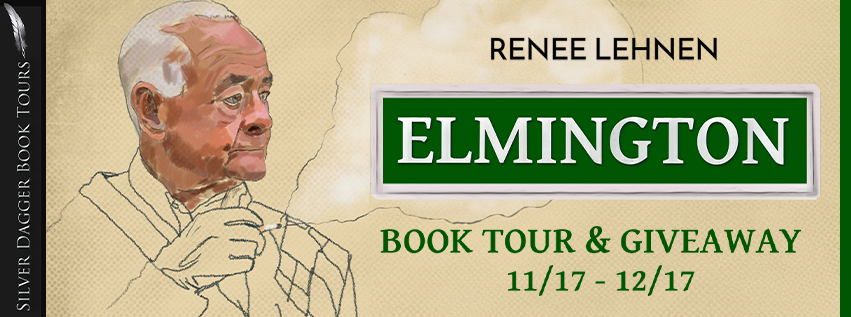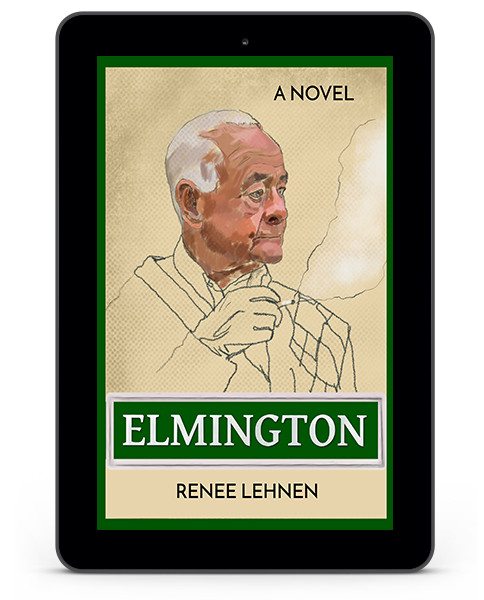No good deed goes unpunished in a willfully blind, technocratic society.
Elmington
by Renee Lehnen
Genre: Social Satirical Fiction
No
good deed goes unpunished in a willfully blind, technocratic
society.
Gordon
Gray, a retired librarian, only wishes to chain smoke, read
twentieth-century novels by dead white men, and at the time of his
choosing, shuffle off his mortal coil. Everyone from his
thanatophobic doctor to his New Age neighbour has an opinion on what
Gordon should want and how he should be treated. When his daughter
Martha arrives from the West Coast, she finds Gordon disheveled,
wheezy, and cantankerous in his squalid bungalow. She remains in
Elmington to negotiate with his meddlesome entourage and look after
him. Seven months later, Gordon is dead, and Martha is in police
custody for the crime of caring unconventionally.
Winner
of the Crime Writers of Canada Award of Excellence for Best
Unpublished Manuscript in 2022
“Very
engaging, great dialogue, great dark humour and social commentary.”
– Crime Writers of Canada Judges
"The central
characters in Elmington crackle with complexity and conflicted
feelings as they navigate the minefield of end-of-life decision
making. As Renee Lehnen’s pitch perfect prose animates the
fictional town, the tensions simmering just below its gleaming
surface emerge. This timely and unforgettable book confronts the most
difficult choices a family can be asked to make - and the constraints
within which those decisions are forced to unfold.” — Judith
Harway, author of the memoir Sundown and
three collections of poetry
Amazon * Apple * B&N * Kobo * Smashwords * Books2Read * Bookbub * Goodreads
“Open the drapes, Duchess,” Gordon squawked. “See what’s become of your old neighbourhood.”
Martha went to the bay window, pulled the heavy, burgundy curtains across the rod, and squinted into sunshine. When she’d arrived by taxi in the night, the haze of streetlights only vaguely outlined the houses on Roselea Drive. She could see alright now. Across the street stood Falstaff in a Zen garden—a half-timbered Jolly Olde English cottage on steroids surrounded by geometric topiary.
“Who lives there, Dad?” asked Martha, pointing.
“Bean counter,” Gordon wheezed. “A modern-day Bob Cratchit who toils over ledgers for one of the Bay Street banks.”
“Do you know his name?”
“Nope.”
“I’ll bet he can afford a Christmas turkey.”
“Sure,” agreed Gordon. “But he probably prefers a thistle salad. His soul is harder than a dried pea. I’ve only spoken to him once, while he was orchestrating the disgorgement of his belongings from a moving van into that, that… house… and I knew by the way he treated the box carriers that there was no point in pursuing neighbourly friendship.” Gordon waved a liver-spotted hand dismissively, then coughed.
“How about them?” Martha gestured toward the grand Cape Cod style house on their right.
“An advertising exec and his social x-ray wife. Rest in peace, Tom Wolfe. . . .”
“Nice house.”
“Yup. I imagine the happy couple inside it, drinking martinis and mending nets by the hurricane lamp.”
“Are there any kids in the neighbourhood now?”
“A few, though you never see them. They’re ferried about by SUV, school to sports to elocution classes or whatever kids get up to these days. There’s a boy next door, on the left.”
“Do you know his name?”
“Ethan. Like the furniture.”
Martha smiled. Of course, the old man remembered the boy’s name.
“Poor kid will never have a paper route, or play ball hockey, or soap windows on Halloween,” wheezed Gordon. “His mother, Joanne, keeps him on a strict schedule. He’s fourteen, for crying out loud.”
“Who’s crying out loud?”
“I am. On the lad’s behalf. By the way, how’s Joseph?”
“Still incommunicado,” replied Martha, voice faintly forlorn. “His community doesn’t believe in using modern technology—you know, like telephones—and it’s peach season in the Okanagan, so I guess he’s too busy to write or get in touch.”
“His community or his cult?”
“Take your pick.”
Her answer hung in the air while the old man hacked and spat into a Kleenex. She peered through the slanted glass at the home of poor Ethan. The house was reclad in pastel angel stone and stucco and a shiny, black Lincoln Navigator sat on equally black, freshly sealed asphalt.
Her gaze shifted to her father’s front yard. The Corolla had come to rest at an odd angle on the crumbling driveway. No doubt the old man had become a menace to pedestrians, cyclists, and other motorists on the broad streets of Elmington. Since her mother’s death three years prior, weeds had invaded the flower borders and now lamb’s quarter and wild carrot grew among the roses and hostas. The lawn was almost knee-high.
“I’ll mow today,” said Martha.
“You’ll do no such thing,” Gordon countered. “I hired a company to do it. It’s been a wet summer. They’re just behind. Now I’ll thank you for straightening the drapes and bringing me coffee.”
“Okay. Coffee.”
Martha crossed the shag carpet, passed through a short hallway, and entered the kitchen. The linoleum was sticky under foot. Twin dog bowls, one with dusty kibble, the other empty, graced the corner, although her mother’s Pekinese, “Mutsu,” had died several months prior. On the counter, dirty spoons and glasses and cups ringed by evaporating liquids awaited a dishwasher who hadn’t come. Until now. This was the first chore she’d tackle. . . .
While Martha waited for the water to boil, she looked through the window over the sink. The kitchen faced northwest, in shadow for much of the day. However, it wasn’t the dimness of the room she found depressing, but the absence of three graceful spruces that used to mark the property line behind the house. Now a tall, wooden fence, ugly side out, guarded the lot to the rear and a new monster home dwarfed the bungalow.
She leaned against the counter and considered the old man’s circumstances. He was slipping from chronic ill health into advanced decrepitude. Following a weekend conference in Toronto, she’d intended to stay in Elmington for a few days, then fly back to Vancouver for the beginning of the fall term. Plainly that would be impossible. The old man had to be sorted out. At the very least, he needed home care. Better yet, a move to a nursing home, but he’d never agree to that.
The kettle whistled. Martha poured boiling water into the mugs and stirred. The milk in the fridge was curdled sludge. They’d have to drink their coffee black this morning, bracing and hot. She carried the mugs to the living room and set her father’s mug on a tray table piled with books, next to his recliner.
For the first time that morning, he smiled at Martha, revealing a row of yellow teeth that resembled broken doweling. “Thank you, Duchess.”
As a young, socialist firebrand, she’d hated that nickname. Now she didn’t mind it. “You’re welcome, Dad,” replied Martha, returning his smile.
Renee Lehnen is a registered nurse by profession and a writer by passion. Her short stories have been published in the anthologies "Dark Secrets" and "Murder! Mystery! Mayhem!" In addition, she was the 2019 winner and 2020 runner-up of Stratford Rotary’s short story contest. In 2023, her Victorian romance novel, "What Love Demands", was released by The Wild Rose Press under her pen name, Renata North. Renee lives in Stratford, Ontario with her husband.
Website * Facebook * Twitter * Instagram * Bookbub * Amazon * Goodreads
Follow the tour HERE for special content and a giveaway!
$20 Amazon giftcard – 1 winner,
Print copy of Elmington – 4 winners,
ebook of Elmington - 12 winners!










No comments:
Post a Comment